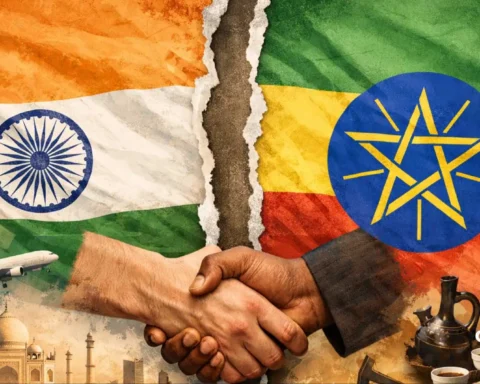In November 2023, Union Minister Ajay Misra stated that the completion of the Citizenship Amendment Act’s (CAA) final draft is expected by March 30, 2024.
Union Home Minister, Amit Shah – February 10, 2024
Union Home Minister Amit Shah announced that the Citizenship (Amendment) Act (CAA) will be implemented before the 2024 Lok Sabha elections to grant Indian citizenship to persecuted refugees from Bangladesh, Pakistan, and Afghanistan, specifically Hindu, Sikh, Buddhist, Jain, Parsi, and Christian illegal migrants from these countries, as of December 2019.
Shah spoke at the ET Now-Global Business Summit in Delhi. He said, “CAA is an act of the country…It will be notified before the polls. There should be no confusion around it. Minorities in our country, and especially our Muslim community, are being provoked…CAA cannot snatch away anyone’s citizenship because there is no provision in the Act. CAA is an act to provide citizenship to refugees who were persecuted in Bangladesh and Pakistan”.
He also said that the CAA allows non-Muslim communities from Afghanistan, Bangladesh, or Pakistan, regardless of their Indian origin, to apply for citizenship without having to prove their origins.
Meghalaya’s Chief Minister, Conrad Sangma – Feb 21, 2024
Meghalaya’s Chief Minister, Conrad Sangma, has expressed concerns over the Citizenship Amendment Act (CAA) and Inner Line Permit (ILP) in the state. He stated that most areas fall under the Sixth Schedule, which is exempt from citizenship law. Sangma also emphasised the need for ILP to restrict outsider entry.
The ILP is a travel document that allows Indian citizens to visit certain areas in the northeastern states of Arunachal Pradesh, Nagaland, Manipur, and Mizoram. The exemption of these areas from the Citizenship Amendment Act (CAA) was a result of discussions and consultations with various stakeholders, including political leaders and civil society groups, who raised concerns about the potential impact of the CAA on these regions.
AIMIM President, Asaduddin Owaisi – February 21, 2024
All India Majlis-e-Ittehadul Muslimeen (AIMIM) president Asaduddin Owaisi criticised the Citizenship (Amendment) Act (CAA) as a “wrong law” that goes against the country’s essence and is based on religion to “trouble” Muslims.
He points out that the absence of a workable law or policy for victims of religious persecution looking to India for asylum raises concerns about how committed the government is to upholding their rights. Citizenship based on religion is incompatible with the Constitution’s values of justice and equality. He has stated that despite the majority’s rejection of the proposed Constitution’s religious requirements for citizenship, the current administration has managed to impose them.
The Citizenship Amendment Act 2019
The Act grants Indian citizenship to religious minorities who fled neighbouring Muslim-majority countries before December 2014 due to persecution or fear of persecution, including Hindus, Sikhs, Buddhists, Jains, Parsis, and Christians. Indian migrants who entered India after December 31, 2014, after having faced or feared religious persecution, are eligible for citizenship under the Citizenship Amendment Act. They will be granted fast-track citizenship within six years, and the naturalisation residence requirement will be relaxed from eleven to five years.
India faced widespread protests against the CAA, citing concerns about discrimination against Muslims and constitutional equality, as well as the exclusion of religious minorities from regions like Tibet, Sri Lanka, and Myanmar. The Indian Supreme Court heard petitions challenging the constitutionality of the CAA, which aims to grant Indian citizenship to religious minorities who faced persecution in neighbouring countries.
Global Implications
The controversial Citizenship Amendment Act 2019 led to India being isolated from the international community, with traditional allies questioning India’s actions. Malaysia, Turkey, the United States, Japan, and Bangladesh heavily criticised India. The United Nations Human Rights Office condemned the law as fundamentally discriminatory and called for its immediate review.
World leaders such as French President Emmanuel Macron, German Chancellor Angela Merkel, and the United Nations High Commissioner for Refugees also expressed concerns about India’s foreign policy and decision-making. The CAA was even compared to the Nuremberg Laws of Nazi Germany, as both laws discriminate against religious minorities, although they differ in details.
The Indian government’s recent actions, including the Citizenship Amendment Act (CAA), were criticised by international bodies and leaders, leading to a loss of trust and support from global partners.
2024 Elections
Over the years, the Modi government has strengthened India’s foreign policy and gained recognition as a rising power on international platforms. The government is seeking a third term in the 2024 April-May national elections. This is at a time in history when India is looking forward to becoming the third-largest economy by 2027. The 2024 election season will probably be marred with debates and discussions on the issue. The citizenship issue looms large for the common man who struggles to make ends meet. It is clear that no one wishes to be a second-class citizen. Much less is the wish to start life afresh elsewhere.
Indian Democracy
The nationwide protest against the Citizenship Amendment Act 2019 in India highlighted the deep division within the country and the international community. India could face further criticism from the world due to the CAA. Concerns have been raised about India’s commitment to minority rights and its secular and heterogeneous character. Over the years, India’s democratic standing has sunk.
Global Allegations
The Economist Intelligence Unit (EIU), the Varieties of Democracy Institute (V-DEM), and Freedom House provide some of the most influential democracy rankings.
The EIU, the research and consulting arm of the Economist magazine (based in London), strongly opposes India’s BJP government. The organisation has deemed India a “flawed democracy” due to its decline since Modi’s 2014 presidency, dropping from 27th to 46th globally and highlighting the significant deterioration in democracy quality under Modi. The EIU lowered its rating of Indian democracy to an all-time low in 2021, warning of backsliding under Narendra Modi‘s policies, which have fueled anti-Muslim sentiment and religious strife, and citing the Citizenship (Amendment) Act 2019.
Sweden’s Varieties of Democracy Institute ranks India lower than Myanmar and Papua New Guinea in electoral democracy and liberal democracy, claiming it is no longer a liberal democracy. The V-DEM report in 2018 and 2020 identified India as a “backslider on democracy,” with Modi’s India and Trump’s America being ranked alongside the United States for their decline. The 2021 V-DEM report reclassified India as an “electoral autocracy”, comparing 2019-2020 democracy quality to 1975-1977, retroactively occurring in 2019 with BJP’s second term.
(Source: ourworldindata)
The V-DEM report argues that India’s autocratization process is restricting civil society through the Foreign Contributions Regulation Act (FCRA), which was amended in 2020 by the BJP government and is closely regulated by domestic civil society organisations. The amendment imposed stricter regulations on foreign funding, expanded the definition of “foreign source,” increased scrutiny and oversight, and extended the validity of registration certificates for organisations to comply with the amended regulations.
Freedom House, an American think tank, considers India only partially free, with an overall freedom rank of tied-85th, and lists the Indian union territory of Jammu and Kashmir as “unfree.” The organisation published an annual Freedom in the World report in 1973, rating countries’ political rights and civil liberties on a scale from 1 to 7, which has become a crucial indicator of democracy quality. Its informal score on India’s democracy dropped from 77th to 85th after the 2019 election, with India’s score fluctuating between 75-78 points. The US-funded index ranks America’s democracy only tied-57th, below Argentina, Mongolia, and Western Europe.
Pew Research Center data shows that 19% of India’s Muslims voted for BJP candidates in the 2019 elections, despite only 49% of Hindus voting for the BJP. Prime Minister Modi’s Muslim outreach, despite scepticism, should be applauded.
Challenges and Reform
India, the world’s largest democracy, is one of the world’s oldest, having a record of 75 years of free and fair elections under the rule of law. Despite the Emergency (1975-1977), India’s democratic record remained intact, with elections resulting in a landslide victory for Gandhi.
India is the world’s poorest democracy, with repeated elections and peaceful power transitions, and it is the only major post-colonial state to remain a democracy. However, its GDP per capita is slightly higher than sub-Saharan Africa’s. Indian society’s perceived failures in democracy may be due to maintaining order in a low-resource environment. The citizens of India must prioritise pluralism, tolerance, co-existence, and secularism to maintain international peace, security, and prosperity.
The Future
Prosperity comes after peace. The new government or the current government (as the case may be) should keep this in mind. Whether the ideology is that of Sanatana dharma or secularism, it is prudent for the leaders to maintain law and order. The difference between religions is an ongoing discussion that can be conducted in healthy ways. The similarities are more than the differences. Only when leaders and the public realise this will the nation grow to greater heights. Optimism calls for the ambition to become a superpower despite limitations, forced or otherwise.
As far as Indian citizens are concerned, it will benefit them if they make the right choices. It also depends on what India means to you. The onus is on the citizens to create the proper foundation for future generations to live in harmony. A humble request is to focus on the future and not hang on to the past since the past is a lesson to move forward and not to be repeated.










This stage is fabulous. The magnificent information uncovers the publisher’s excitement. I’m shocked and envision additional such extraordinary presents.
This website is unbelievable. The radiant material shows the creator’s enthusiasm. I’m dumbfounded and envision more such astonishing sections.